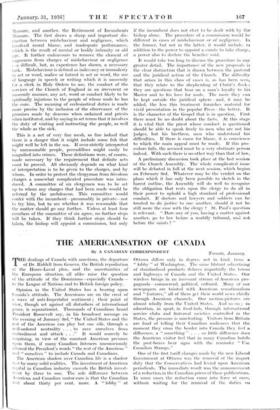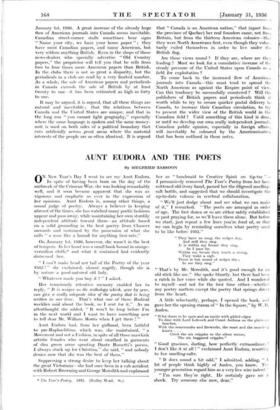THE AMERICANISATION OF CANADA
By A CANADIAN CORRESPONDENT
Toronto, January.
THE dealings of Canada with sanctions, the departure • of Dr. Riddell from Geneva, the British repudiation of the Hoare-Laval plan, and the uncertainties of the European situation, all alike raise the question of the attitude of the Dominions—especially Canada— to the League of Nations and to British foreign policy.
Opinion in the United States has a bearing upon Canada's attitude. The Americans are on the crest of a wave of anti-Imperialist sentiment ; their point of view, though set against all disturbers of international peace, is separationist. Thousands of Canadians heard President Roosevelt say, in his broadcast message on the evening of January 3rd, " the United States and the rest of the Americas can play but one role, through a well-ordered neutrality . . . to save ourselves from embroilment and attack . . ." It would scarcely be surprising, in view of the constant American pressure upon them, if many Canadian listeners unconsciously allowed the President's words " the rest of the Americas " and " ourselves " to include Canada and Canadians.
The American shadow. over Canadian life is a shadow cast by many solid realities. The investment of American capital in Canadian industry exceeds the British invest- ment by three to one. The sole difference between American and Canadian motor-cars is that the Canadian -t about thirty per cent. more. A " lobby " at Ottawa differs only in degree, not in kind, from a " lobby " at Washington. The same blatant advertising of standardised products defaces impartially the towns and highways of Canada and the United States. Our wireless brings in an incessant stream of American pro- paganda—commercial, political, cultural. Many of our newspapers are tainted with American sensationalism and " features," all of them get their world news chiefly through American channels. Our motion-pictures are almost wholly from the United States. And so on ; in education, in sport, in food-fads, through international service clubs and fraternal societies controlled in the States, the pressure is unrelenting. Visitors from Britain are fond of telling their Canadian audiences that the moment they cross the border into Canada they feel a difference, a " something " . . . so little difference does the American visitor feel that in many Canadian hotels the post-boxes bear signs with the reminder " Use Canadian Stamps."
One of the first tariff changes made by the new Liberal Government at Ottawa was the removal of the import duty that the Conservatives had levied upon American periodicals. The immediate result was the announcement of a reduction in the Canadian prices of these publications. In some cases the reduction came into force at once, without waiting for the removal of the duties on January 1st, 1936. A great increase of the already huge flow of American journals into Canada seems inevitable. Canadian street-corner stalls sometimes bear signs " Name your city, we have your home paper " ; they have most Canadian papers, and many American, but very seldom anything British. Even in the shops of those news-dealers who specially advertise " Old Country papers," the proprietor will tell you that he sells from two to four times more American papers than British. In the clubs there is not so great a disparity, but the periodicals in a club arc read by a very limited number. As a whole, the sale of American papers and periodicals in Canada exceeds the sale of British by at least twenty to one—it has been estimated as high as forty to one.
It may be argued, it is argued, that all these things are natural and inevitable ; that the relations between Canada and the United States are unique, and that in the long run " you cannot fight geography," especially where the same language is spoken and the same money- unit is used on both sides of a political boundary that cuts artificially across great areas where the material interests of the people are so often identical. It is argued that " Canada is an American nation," that (apart froze the province of Quebec) her real founders came, not from Britain, but from the thirteen American colonies—that they were North Americans first, even though they volun- tarily exiled themselves in order to live under the British flag.
Are these views sound ? If they are, where are thev leading ? Must we look for a cumulative increase of the steady pressure of the United States upon Canada as a field for exploitation ?
To come back to the increased flow of American journals into Canada—this must tend to spread the North American as against the Empire point of view. Can this tendency be successfully countered ? Will the publishers of British papers and periodicals think it worth while to try to secure quicker postal delivery to Canada, to increase their Canadian circulation, to try to present the wider view of the British world in the Canadian field ? Until something of this kind is done, or until we develop our own really independent journals, Canadian public opinion, especially in foreign affairs, will inevitably be coloured by the Americanisation that has been outlined in these notes.











































 Previous page
Previous page